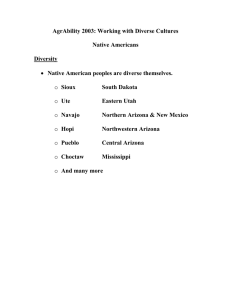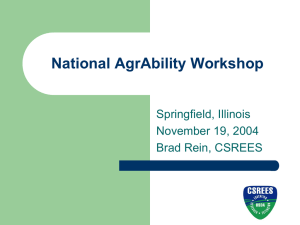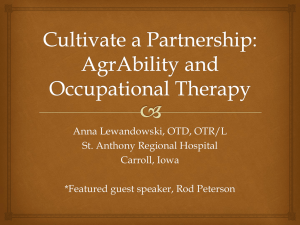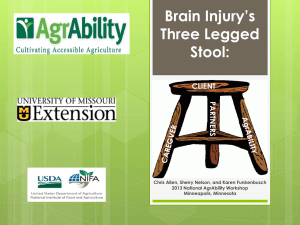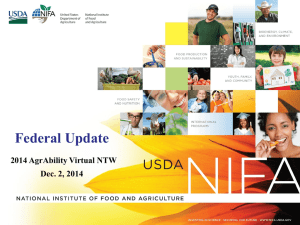Heather Boyd PowerPoint
advertisement
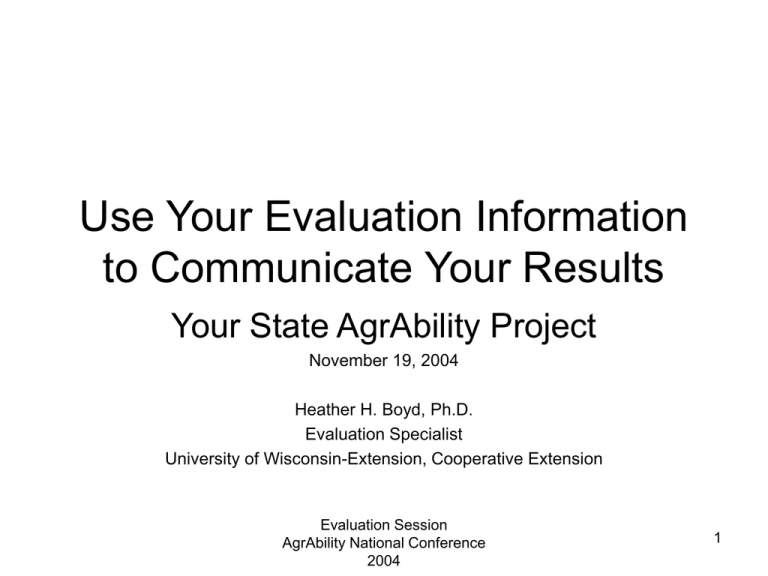
Use Your Evaluation Information to Communicate Your Results Your State AgrAbility Project November 19, 2004 Heather H. Boyd, Ph.D. Evaluation Specialist University of Wisconsin-Extension, Cooperative Extension Evaluation Session AgrAbility National Conference 2004 1 Goals of Session • Goal One – Clarify the goals of your state project Evaluation Session AgrAbility National Conference 2004 2 Goals of Session • Goal Two – Determine the evidence you need to demonstrate project results Evaluation Session AgrAbility National Conference 2004 3 Goals of Session • Goal Three – Consider ways to better incorporate people with disabilities into your state project’s program planning, evaluation and communication • Especially farmers, ranchers, growers, producers and non-farm agribusiness professionals Evaluation Session AgrAbility National Conference 2004 4 Goals of Session • Goal Four – Learn how to focus your evaluation energy on outcomes, impacts and results that your funders, persons with disabilities and other program partners value most Evaluation Session AgrAbility National Conference 2004 5 By the end of the session… • You will – Be able to articulate your state’s goals in relationship to the national project’s goals – Have a draft of an evaluation plan for your state project, including one type of evidence that helps you demonstrate results – Be able to name one way to include more people with disabilities in your program planning, implementation or evaluation Evaluation Session AgrAbility National Conference 2004 6 Background • What do these words make you think about? – Evaluation – Inclusion – Outcomes and Impacts Evaluation Session AgrAbility National Conference 2004 7 Let’s agree on a few things • Evaluation can include gathering and analyzing credible evidence about the results (or lack of) your programming • Including people with disabilities in your planning and evaluation improves your program, including its credibility and results • People want things to change as a result of the programs they are involved in Evaluation Session AgrAbility National Conference 2004 8 Your State Project Goals • What are your goals? • Do your staff and stakeholders share these goals? How did you create them? • How are people with disabilities included in creating your project’s goals? Evaluation Session AgrAbility National Conference 2004 9 National AgrAbility Project Goal • “AgrAbility increases the likelihood that individuals with disabilities and their families engaged in production agriculture (AgrAbility’s customers) become more successful.” www.csrees.usda.gov/funding/rfas/04_agrability. html#PURP Evaluation Session AgrAbility National Conference 2004 10 Your Credible Evidence • Refer back to your state goals. What are some ways that you can tell that you are reaching them? – Examples of credible evidence from participants • How are people with disabilities included in the discussion of what is “successful”? Evaluation Session AgrAbility National Conference 2004 11 National Project Credible Evidence • “Measures of success may include improvements in customers’ financial stability or access to life activities and in the capacity of states and regions to deliver services this population requires in a timely and satisfying manner.” http://www/csrees.usda.gov/funding/rfas/PURP Evaluation Session AgrAbility National Conference 2004 12 Credible Evidence • Are the following examples of “success” for a state project? – If so, why? – If not, why? – What further information would be important to share regarding the example if you were reporting to a funder, supporter, person with a disability or other stakeholder? Evaluation Session AgrAbility National Conference 2004 13 Credible Evidence? • A rancher with schizophrenia met with AgrAbility staff and members of his personal support network to create a plan for consistently taking the medication that helps to keep him functioning well. Evaluation Session AgrAbility National Conference 2004 14 Credible Evidence? • With appropriate assistive technology provided through a local granting network, a crop grower with osteoarthritis was able to plant 400 more acres of corn this season. AgrAbility staff connected the grower with staff from the granting program. Evaluation Session AgrAbility National Conference 2004 15 Credible Evidence? • A dairy producer with multiple disabilities decided to leave the dairy industry and entered a non-farm agribusiness arrangement as a lender with a local financial institution. AgrAbility helped the dairy producer with his career goal clarification. Evaluation Session AgrAbility National Conference 2004 16 Credible Evidence Exercise • Describe one success of your project to a person sitting near you, and include the evidence of success. • Now, the other person does the same. • Describe what further information you would need about the success, if any, to make it more credible to you. Evaluation Session AgrAbility National Conference 2004 17 Your State Framework • What approaches does your state use to implement your program? • How does this affect your evaluation opportunities? – Discuss example of person-centered planning Evaluation Session AgrAbility National Conference 2004 18 Person-Centered Planning • Some common elements (O’Brien & Lovett, referred to at www.inclusion.com) – Persons with disabilities are at the center of support networks that respect their dignity and desires – Group learns together through shared experience with the person – Goal is to enlist and engage a wider circle of support for the person in the person’s community Evaluation Session AgrAbility National Conference 2004 19 Person-Centered Planning • If you use it for your program, you can also use it for your evaluation – Clarifies goals for individuals – Uses information from individuals and their networks to determine progress toward goals – Depends upon continuous improvement and collaborative action Evaluation Session AgrAbility National Conference 2004 20 Inclusion and Evaluation • Person-Centered Planning • Asking people with disabilities to participate in planning, implementing and evaluating programming • Asking people with disabilities to serve on advisory boards Evaluation Session AgrAbility National Conference 2004 21 Your State Project and Inclusion • Where and how do you already include people with disabilities in program planning, implementation and evaluation? • Where and how do you already include farmers, ranchers, producers, growers? Evaluation Session AgrAbility National Conference 2004 22 Your State Project and Inclusion • Where could you do more to include people with disabilities in program planning, implementation and evaluation? • Where and how do you already include farmers, ranchers, producers, growers with disabilities? Evaluation Session AgrAbility National Conference 2004 23 Focusing Your Evaluation Energy • What is your evaluation question? • What is credible information? • Do you already have the information or do you need to gather it? • How much time and money do you have? Evaluation Session AgrAbility National Conference 2004 24 Focusing Your Evaluation Energy • How will you and others use the information? – What formats help accommodate different learning styles and different people with disabilities? • How much time and money do you have? • Who will share the responsibilities? Evaluation Session AgrAbility National Conference 2004 25 Wrap-Up Questions and Answers Evaluation Planning Worksheet Evaluation Session AgrAbility National Conference 2004 26 Acknowledgements • Thank you to those who improved this presentation with their feedback: – – – – – – Beth Swedeen, Waisman Center Jenny Wagner, Waisman Center Leah Nell Adams, AgrAbility Bob Meyer, Biomedical Engineering John Klatt, Program Development & Evaluation Wintford Thornton, Program Development & Evaluation Evaluation Session AgrAbility National Conference 2004 27
